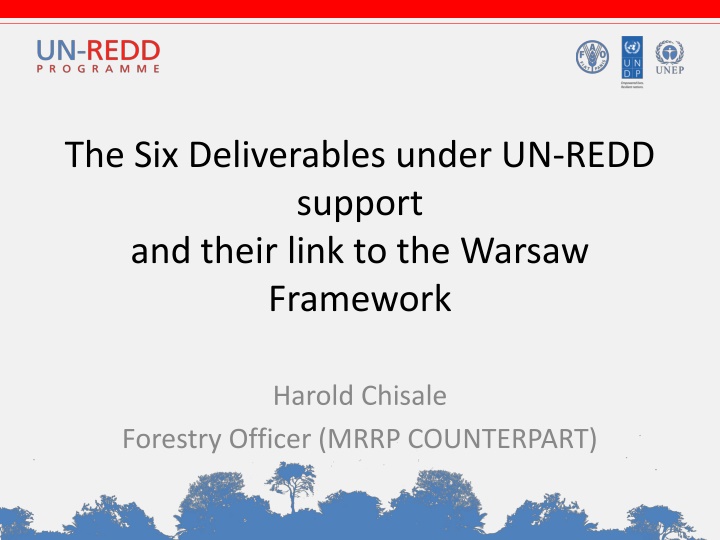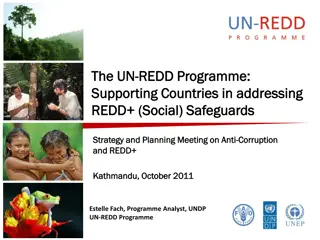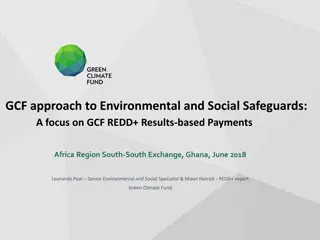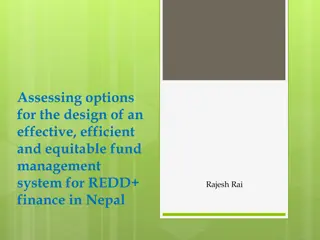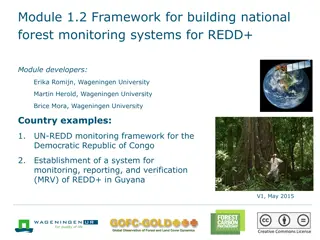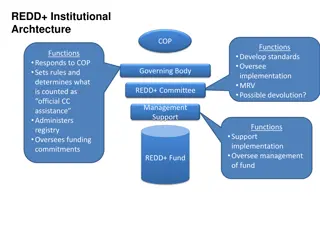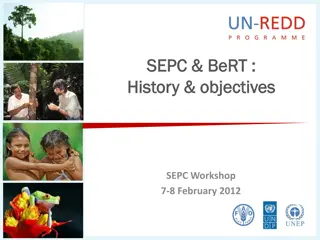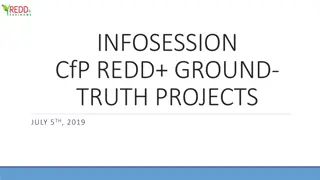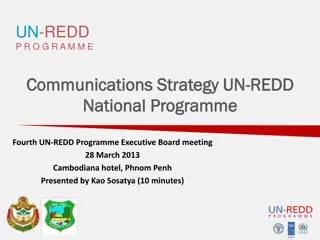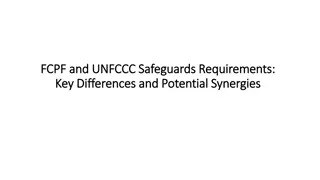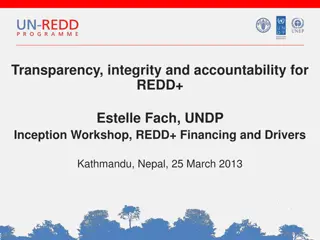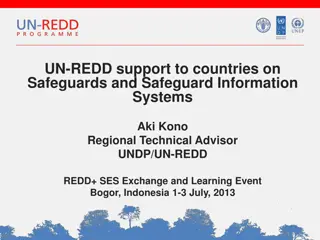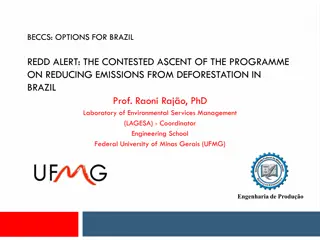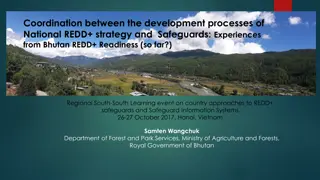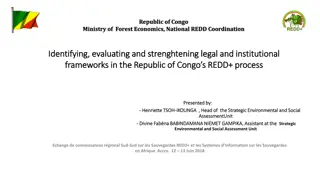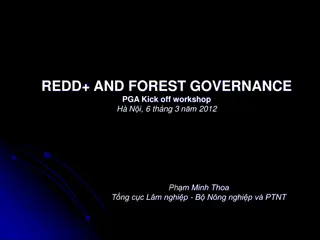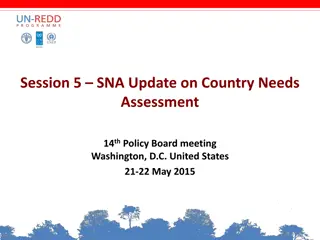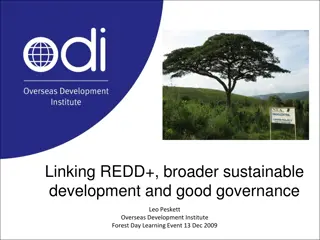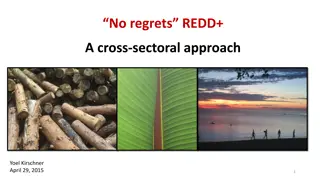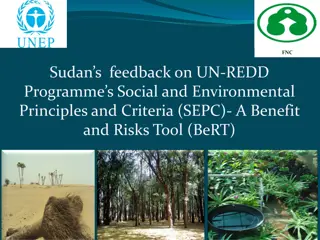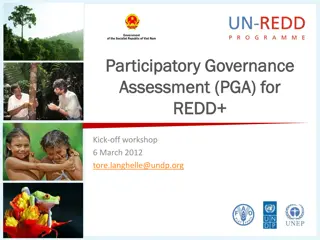National Leadership and Stakeholder Engagement in REDD+ Support
National leadership, stakeholder engagement, and participation are essential elements of the Warsaw Framework to ensure coordination and coherence in REDD+ efforts. The six deliverables under UN-REDD support in Malawi, linked to the Warsaw Framework, include analysis of policy frameworks, corruption risk assessment, and roadmaps for national REDD+ strategy and forest monitoring systems.
Download Presentation

Please find below an Image/Link to download the presentation.
The content on the website is provided AS IS for your information and personal use only. It may not be sold, licensed, or shared on other websites without obtaining consent from the author.If you encounter any issues during the download, it is possible that the publisher has removed the file from their server.
You are allowed to download the files provided on this website for personal or commercial use, subject to the condition that they are used lawfully. All files are the property of their respective owners.
The content on the website is provided AS IS for your information and personal use only. It may not be sold, licensed, or shared on other websites without obtaining consent from the author.
E N D
Presentation Transcript
The Six Deliverables under UN-REDD support and their link to the Warsaw Framework Harold Chisale Forestry Officer (MRRP COUNTERPART)
National leadership Stakeholder engagement Participation The Four Design Elements of the Warsaw Framework Decision on one element has strong implications on others Consider wider picture Ensure coordination & coherence between REDD+ elements Na onal? Strategy? (NS)? ? or? ? & / NFMS? including? Ac on? Plan? (AP)? MRV? Safeguard? Informa on? system? (SIS)? FREL? /? FRL? More efficient readiness processes 2
Link to the Warsaw Framework of the six deliverables of UN-REDD Support in Malawi Element of the Warsaw Framework National REDD+ Strategy National Forest Monitoring system Safeguards Deliverable under UN-REDD support 1. Analysis of Policy and legal frameworks 2. Institutional and Context Analysis 3. Corruption Risk Assessment 4. Analysis of Malawi s resource tenure regimes 5. Roadmap to a National Forest Monitoring System 6. Roadmap to a 15 year national REDD+ strategy
1. Policy and legal frameworks assessment - Contribution to REDD+ readiness One core objective of the 5 year action plan is To ensure the inclusion of REDD+ within relevant policy and legal frameworks within Malawi The assessment underpins the definition of institutional role allocation for the REDD+ strategy and its description of implementation arrangements. It is a basis for the development of a REDD+ strategy roadmap The assessment will be an important input to designing more detailed assessments of governance aspects (such as institutional context analysis and corruption risk assessment)
1. Policy and legal frameworks assessment Provide detailed analysis of current status of Malawi s natural resource governance frameworks for its potential to support REDD+ implementation, Work with stakeholders to identify gaps, and prioritize needs and options for meeting them that are consistent with the REDD+ Strategy Roadmap, Identify windows of opportunity in a roadmap to operationalize recommendations for reform
1. Policy and legal frameworks assessment Elements of the approach The scope may include: Policies Laws, regulations, programmes Institutions Close coordination with REDD+ Governance working group is key and will be achieved through frequent discussion, consultation and validation Target timeline : April to August 2015
2. Institutional and Context Analysis Part of the Governance Work stream of UN-REDD support Focuses on The National REDD+ context: Why is REDD+ important for Malawi? Stakeholder Mapping: Who are the relevant actors for REDD+? Context Analysis: What are the interests, political conditions, power relations in the REDD+ arena in Malawi Seeks to answer the question : What are the rules, and who are the actors in REDD+ Malawi?
2. Institutional and Context Analysis- Methodology & Objectives Examines de facto application of the formal institutions and rules, therefore looking at how societal norms, business interests, political strategies relate to REDD+ in Malawi and influencing its process. Analyses power-relations and networks, incentives and decision-making structures (informal vs. formal) Identifies risks but also potential champions and movers for the formulation of the national REDD+ strategy Considers all relevant stakeholders, including Traditional Authorities, forest communities, and incorporates a gender component.
2. Institutional and Context Analysis The ICA is the initial step of the Malawi REDD+ stakeholder engagement strategy envisaged under the 5-year action plan and facilitates the identification of relevant stakeholders to participate in the national REDD+ process. The ICA provides information on the institutional capacity, ability and willingness of relevant stakeholders to formulate the National REDD+ Strategy. This is in terms of coordination, knowledge and level of engagement. Timeline Finalised within the first two months of UN-REDD support
3. Assessment on Tenure and REDD+ Malawi 5-year action plan - target 3.3.2.B (high priority): To prioritize and implement recommended follow-on actions from the analysis of Malawi s resource tenure regimes and, as necessary, continue to pursue actions intended to clarify tenure and inform the development of a long-term, national REDD+ strategy. Cancun Agreements: Requests developing country partners to address land tenure issues Warsaw Pillar: Relates to taking action to address the drivers of deforestation and degradation (Decision 15/CP.19)
3. Assessment on Tenure and REDD+ Objectives: 1. Provide an in-depth review of the resource tenure systems in Malawi s natural resource sectors that will impact the development and implementation of a successful REDD+ program 2. Provide recommendations and opportunities for tenure reforms that support the Government of Malawi in effectively implementing REDD+. Partners: FAO with ELI & CEPA Timeline: April to November 2015 Deliverables: inception, interim, and final reports, policy brief
3. Assessment on Tenure and REDD+ Methodology & Guiding Principles Methodology: Desk study and review of project (e.g. Kulera) and regional experience with relevance to Malawi Engage key stakeholders across natural resource sectors, including policymakers Map tenure regimes across geographical and cultural regions in Malawi Use identification of policy, legal and institutional gaps to inform recommendations Guiding Principles: Refer to the Voluntary Guidelines on the Responsible Governance of Tenure and PROFOR framework Inclusiveness, transparency, accountability, equity, efficiency
4. REDD+ Corruption Risk Assessment Corruption is not solely about government Corruption can happen at administrative levels or at higher, political levels Anti-Corruption is not solely about enforcement , but also about prevention Preventing corruption in REDD+ is important for : 1) Effectiveness and success of REDD+ policies and measures 2) Trust of international community and investors 3) Trust and avoiding conflicts at national and local levels
4. REDD+ Corruption Risk Assessment Part of the governance workstream Objectives : 1) Analyze the degree of transparency, accountability and inclusiveness of key forest governance processes and institutions and the extent to which corruption in the forestry sector acts as a driver of deforestation and forest degradation 2) Forecast and prepare for potential corruption under REDD+, and provide recommendations and tools to inform the design of constituent REDD+ elements that should address corruption and enhance and sustain good practices Timeline : Builds on the Drivers study and on the Institutional and Context Analysis Expected completion: August 2015
4. REDD+ Corruption Risk Assessment - Approach The REDD+ Corruption Risk Assessment Goes beyond corruption to naturally cover other governance weaknesses that are conducive to corruption (such as lack of transparency, ineffective participation, lack of feedback mechanism, lack of sanctions) Goes beyond empirical evidence and into quantitative analysis is not about blame and shame, but about constructive and collective solutions to major issues is not about all governance issues in the forest sector but rather about addressing the ones that would present the MOST risks to the success of REDD+
5. Malawis roadmap for the National Forest Monitoring System Detailed assessment of current capacity for plot-based forest inventories, land-use mapping and the national GHG inventory Inventory of past capacity development interventions Identification of capacity gaps Compile a proposed set of capacity development interventions in a roadmap
5. National Forest Monitoring System Contribution to REDD+ readiness The NFMS roadmap is a key document towards development an effective and efficient National Forest Monitoring System The National Forest Monitoring System is a requirement of the UNFCCC Warsaw Framework, and important as it serves for international measurement, reporting and verification (MRV). The NFMS is a core objective of the MRP 5-year action plan The NFMS tracks REDD+ results and a reference level: quantitative information on the forests illustrating the performance of REDD+.
5. National Forest Monitoring System - Elements of the approach The scope includes the pillars of the National Forest Monitoring System : Plot-based forest inventory Spatial land monitoring National GHG inventory Reference level setting Close coordination with REDD+ Science Working Group is key and will be achieved through frequent discussion, consultation and validation Target timeline : April to August 2015
6. Roadmap to a National REDD+ Strategy The National REDD+ Strategy is a high priority target of the GoM (5 year action plan) Where are we now and what do we have ? Where do we want to be ? Nationally approved REDD+ strategy Roadmap initiated Roadmap finalized Draft 15 year strategy Today (April 2015) August 2015 End of 2018 End of 2019
Analytical framework that will inform the National REDD+ Strategy
6. Roadmap to a National REDD+ Strategy Messages from the Africa Regional Workshop on national REDD+ Strategies When building a national strategy for REDD+, the quality of the process is as important as the quality of the product The Product(the strategy document) should : capture the vision of the country on REDD+ (and how it fits into the national development process) propose a credible pathway towards results (so as to mobilize stakeholders as well as attract finance), with a clear package REDD+ policies and measures whose feasibility has been assessed indicate the sort of instruments and institutional arrangements that will be employed to ensure REDD+ is governed according to the best environmental, social and institutional practices. The Processis : An opportunity to simultaneously build multiple partnerships to enable its deployment, including high-level political support and broad grassroots engagement.
6. Roadmap to a National REDD+ Strategy Could include 1. Description of the respective roles & responsibilities of the key leading institutions and stakeholders (with a unique institution mandated to direct and supervise the overall process) 2. Identification of the main steps and corresponding support document of the programming process (e.g. Issue & option paper, NS/AP, Investment plan), with adequate regular technical &/or validation processes 3. Stakeholder engagement strategy 4. Capacity building plan 5. Roadmap of analytical work integrating work planned under the % year action plan 6. Formal/informal feedback loops with other Warsaw Framework design elements (NFMS, FRL, Safeguards/SIS) identified 7. Preliminary vision over the positioning of the NS/AP document in the wider national planning framework (Climate Change, Development etc) 8. Key leading institutions and stakeholders understand the way toward the formulation of the strategy and endorse it
How deliverables inform one another Drivers study Awareness and knowledge management Legal and policy analysis ICA NFMS roadmap CRA Tenure 5 year REDD+ action plan National REDD+ Strategy Roadmap
THANK YOU VERY MUCH FOR YOUR ATTENTION
